for的用法分析
批处理for命令详解!

批处理for命令详解!⼤纲⼀前⾔⼆ for语句的基本⽤法三 for /f (delims、tokens、skip、eol、userbackq、变量延迟)四 for /r (递归遍历)五 for /d (遍历⽬录)六 for /l (计数循环)⼀、前⾔在批处理中,for是最为强⼤的命令语句,它的出现,使得解析⽂本内容、遍历⽂件路径、数值递增/递减等操作成为可能;配合if、call、 goto等流程控制语句,更是可以实现脚本复杂的⾃动化、智能化操作;合理使⽤for语句,还能使代码⼤为简化,免除各位编写⼤量重复语句之苦。
⽽能否熟练使⽤for语句,已经成为衡量⼀个⼈批处理⽔平⾼低最主要的标准。
在这个系列教程中,我将通过实际应⽤中频繁出现的例⼦,带领⼤家步⼊for语句的神奇之门,⼀步步迈向for语句的魔幻殿堂,使得⼤家在实际的应⽤中,能独⽴写出简洁⾼效的代码,在批处理的世界⾥⾃由驰骋。
注意:以下的讲解,都是基于简体中⽂版Windows XP Pro SP3的操作系统环境。
⼆、for语句的基本⽤法正如⾊彩缤纷的七彩光芒是由红绿蓝三原⾊构成的⼀样,最复杂的for语句,也有其基本形态,它的模样是这样的:在cmd窗⼝中:FOR %variable IN (set) DO command [command-parameters]在批处理⽂件中:FOR %%variable IN (set) DO command [command-parameters]具体例⼦:For %i in (1 2 3) do @echo %i之所以要区分cmd窗⼝和批处理⽂件两种环境,是因为在这两种环境下,命令语句表现出来的⾏为虽然基本⼀样,但是在细节上还是稍有不同。
最明显的⼀个差异就是:在cmd窗⼝中,for之后的形式变量I必须使⽤单百分号引⽤,即%i;⽽在批处理⽂件中,引⽤形式变量i必须使⽤双百分号,即%%i。
我们先来看⼀下for语句的基本要素都有些什么:1、for、in和do是for语句的关键字,它们三个缺⼀不可;2、%%I是for语句中对形式变量的引⽤,就算它在do后的语句中没有参与语句的执⾏,也是必须出现的;3、in之后,do之前的括号不能省略;4、command1表⽰字符串或变量,command2表⽰字符串、变量或命令语句;现在,你可能已经会写⼀个简单的for语句了,⽐如:[code1]@echo offfor %%I in () do echo %%Ipause保存为批处理⽂件并执⾏,将会在弹出的批处理窗⼝中看到这样的信息:请按任意键继续...很快地,你会觉得这个for语句是如此的简单,简单到你丝毫感受不出它的强⼤:这个for语句,和我直接⽤echo语句没什么两样啊!是的,演⽰代码永远都只是演⽰⽽已,就像⼤多数⾼级语⾔的教科书⼀样,在引导新⼿学习的时候,基本上都是千篇⼀律地告诉⼤家如何编写⼀个能显⽰ hello world! 的窗⼝,从这些演⽰代码中,你看不到它们具有多少实⽤性,你只是感到有点好奇:咦,居然弹出了⼀个窗⼝?⽚刻之后,你就会觉得索然⽆味。
for用法归纳与总结
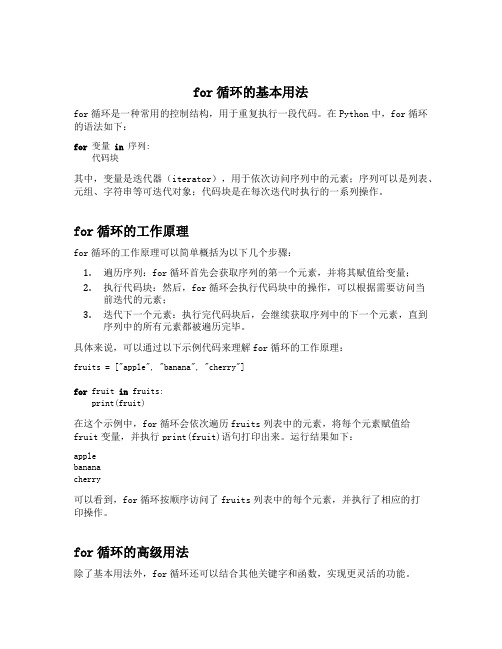
for循环的基本用法for循环是一种常用的控制结构,用于重复执行一段代码。
在Python中,for循环的语法如下:for变量in序列:代码块其中,变量是迭代器(iterator),用于依次访问序列中的元素;序列可以是列表、元组、字符串等可迭代对象;代码块是在每次迭代时执行的一系列操作。
for循环的工作原理for循环的工作原理可以简单概括为以下几个步骤:1.遍历序列:for循环首先会获取序列的第一个元素,并将其赋值给变量;2.执行代码块:然后,for循环会执行代码块中的操作,可以根据需要访问当前迭代的元素;3.迭代下一个元素:执行完代码块后,会继续获取序列中的下一个元素,直到序列中的所有元素都被遍历完毕。
具体来说,可以通过以下示例代码来理解for循环的工作原理:fruits = ["apple", "banana", "cherry"]for fruit in fruits:print(fruit)在这个示例中,for循环会依次遍历fruits列表中的元素,将每个元素赋值给fruit变量,并执行print(fruit)语句打印出来。
运行结果如下:applebananacherry可以看到,for循环按顺序访问了fruits列表中的每个元素,并执行了相应的打印操作。
for循环的高级用法除了基本用法外,for循环还可以结合其他关键字和函数,实现更灵活的功能。
range()函数range()函数是常用于生成一个指定范围内的整数序列的函数,可以与for循环搭配使用。
它的常见用法如下:for i in range(start, stop, step):代码块其中,start是起始值(默认为0),stop是结束值(不包含stop本身),step 是步长(默认为1)。
下面是一个使用range()函数的示例:for i in range(1, 6):print(i)输出结果为:12345enumerate()函数enumerate()函数用于在for循环中同时获取元素索引和值,可以方便地追踪迭代的位置。
about与for的用法区别

about与for的用法区别一、about与for的用法区别在英语中,动词后常会跟着介词,其中"about"和"for"是两个常见的介词。
它们在使用上有一定的区别,下面将分析这两个介词的用法差异。
1. 表示目的的介词:"about"表示关于某事或某物的信息,而"for"表示为了某个目标或目的。
比如:A) "I read a book about dogs."(我读了一本关于狗的书。
)"about dogs"指的是书籍内容所涉及到的主题是狗。
B) "I bought a gift for my friend."(我给我的朋友买了一份礼物。
)"for my friend"意味着这份礼物是为我朋友准备的。
2. 表示围绕或涉及范围:"about"用于描述围绕某个话题或范围展开,而"for"通常指特定对象或一个特殊目标。
例如:A) "Let's talk about your vacation plans."(我们来谈谈你的度假计划。
)这里使用了“talk about”表示讨论一个具体话题, 即度假计划。
B) "This book is for children."(这本书是给孩子们准备的。
)这句话中,"for children"指的是这本书特别为儿童而设计。
3. 表示关于喜好或态度:"about"用于表达某人对事物的感受或看法,而"for"则表示对某事物有利或赞同。
例如:A) "She is very enthusiastic about sports."(她对体育非常热衷。
)这里使用了“enthusiastic about”表达对体育的兴趣和热情。
for to的用法与区别
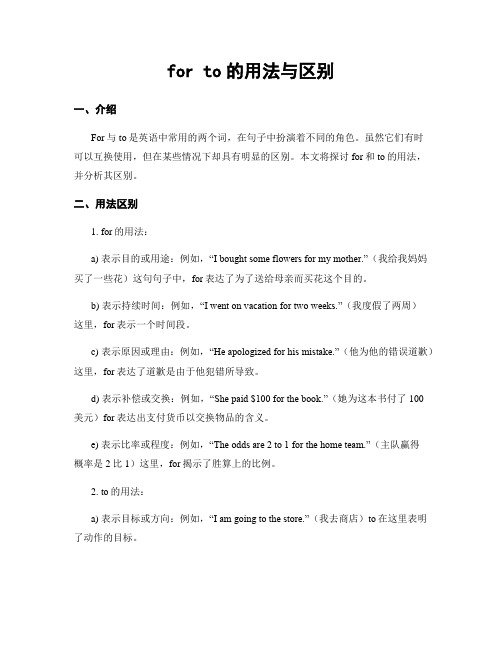
for to的用法与区别一、介绍For与to是英语中常用的两个词,在句子中扮演着不同的角色。
虽然它们有时可以互换使用,但在某些情况下却具有明显的区别。
本文将探讨for和to的用法,并分析其区别。
二、用法区别1. for的用法:a) 表示目的或用途:例如,“I bought some flowers for my mother.”(我给我妈妈买了一些花)这句句子中,for表达了为了送给母亲而买花这个目的。
b) 表示持续时间:例如,“I went on vacation for two weeks.”(我度假了两周)这里,for表示一个时间段。
c) 表示原因或理由:例如,“He apologized for his mistake.”(他为他的错误道歉)这里,for表达了道歉是由于他犯错所导致。
d) 表示补偿或交换:例如,“She paid $100 for the book.”(她为这本书付了100美元)for表达出支付货币以交换物品的含义。
e) 表示比率或程度:例如,“The odds are 2 to 1 for the home team.”(主队赢得概率是2比1)这里,for揭示了胜算上的比例。
2. to的用法:a) 表示目标或方向:例如,“I am going to the store.”(我去商店)to在这里表明了动作的目标。
b) 表示将要发生的事情:例如,“You need to finish your homework.”(你需要完成你的家庭作业)to表示即将发生某个动作。
c) 表示比较:例如,“He is taller than his brother.”(他比他弟弟高)to用来进行两种事物之间的比较。
d) 表示所属关系:例如,“That book belongs to me.”(那本书是我的)to表达出所有权关系。
e) 表示目的或意图:例如,“I am studying hard in order to pass the exam.”(我努力学习以便通过考试)to表达出为实现某个目的或意图而做某事。
双宾语结构to 与for的用法

双宾语结构to 与for的用法双宾语结构是一种句子结构,其中有两个宾语,一个直接宾语和一个间接宾语。
通常情况下,直接宾语是受动作影响的人或物,而间接宾语则是收益者或影响者。
其中,to和for是两个常见的介词,用来连接不同的宾语。
在本文中,我们将讨论双宾语结构中to和for的用法,并通过丰富的例子来说明它们的差异。
一、to的用法1.链接动作和受益者在双宾语结构中,to通常用来连接动作和间接宾语,表示动作的受益者或影响者。
例如:- She gave a book to him.(她给了他一本书。
)- The teacher explained the lesson to the students.(老师向学生解释了这节课。
)2.表示目的to也可以表示目的,连接动作和直接宾语。
例如:- I bought a present to my sister.(我给我妹妹买了一份礼物。
)- They built a house to their parents.(他们为他们的父母建了一所房子。
)3.表示性格或倾向to还可以用来表示动作对间接宾语的影响,表达某种性格或倾向。
例如:- He was kind to his friends.(他对他的朋友很友好。
)- She is rude to her colleagues.(她对她的同事很粗鲁。
)二、for的用法1.表示行动目的在双宾语结构中,for通常用来表示动作的目的或原因。
例如:- I bought some flowers for my mom.(我给我妈妈买了一些花。
)- She made a cake for her boyfriend.(她为她的男朋友做了一个蛋糕。
)2.表示代理或受益者for也可以表示动作的代理或受益者。
例如:- She opened the door for him.(她为他打开了门。
)- He wrote a letter for his grandfather.(他给他的爷爷写了一封信。
for的用法总结

for的用法总结for是英语中一个常用的介词和连词,具有多种用法。
在此文章中我将总结和解释for 的各种用法,希望能帮助大家更好地理解和运用这个词。
首先,for可以表示“为了”的意思,用于引导表示目的的短语或句子。
例如,“She is studying hard for the exam.”(她为了考试而努力学习)。
这种用法强调一个行动或状态的目的或原因。
其次,for还可表示“在……期间”或“在……时候”,用于表示时间的持续。
比如,“I lived in London for three years.”(我在伦敦住了三年)。
这种用法强调一个动作或状态发生的时间段。
另外,for还可以表示“对于”或“关于”,引导表示对象或主题的内容。
比如,“This book is for children.”(这本书是给孩子们的)。
这种用法表示某物或某人是面向特定对象或用途的。
此外,for还可以用于表示“支持”、“拥护”、“为了”等含义,例如,“She is for th e proposal.”(她支持这个提案)。
在这种情况下,for后面通常会跟随一个名词或动词短语,表示支持或拥护的对象或行动。
除了以上几种常见用法外,for还有一些其他意义。
例如,for可以用于表示价格、交换或比率,如“Two for the price of one.”(两个的价格是一个的两倍)。
此外,for还可以与动词不定式结合使用,表示目的或预期的结果,如“Let’s go for a walk.”(我们去散步吧)。
总的来说,for作为一个多功能的介词和连词,在英语中有着丰富的用法。
通过掌握和理解for的各种用法,我们可以更准确地表达自己的意思,使语言表达更加丰富生动。
希望以上内容能够帮助大家更好地理解for这个词的用法,同时也希望大家在学习英语的过程中多多积累更多的词汇和用法,提升自己的语言能力。
1。
for的用法和固定搭配是什么
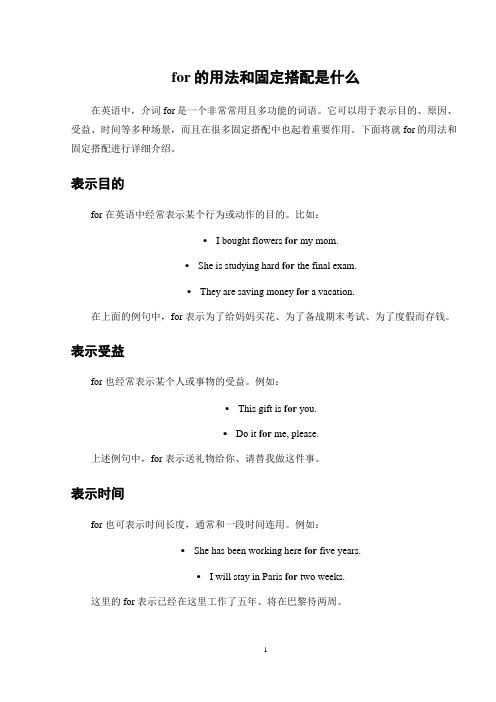
for的用法和固定搭配是什么在英语中,介词for是一个非常常用且多功能的词语。
它可以用于表示目的、原因、受益、时间等多种场景,而且在很多固定搭配中也起着重要作用。
下面将就for的用法和固定搭配进行详细介绍。
表示目的for 在英语中经常表示某个行为或动作的目的。
比如:•I bought flowers for my mom.•She is studying hard for the final exam.•They are saving money for a vacation.在上面的例句中,for 表示为了给妈妈买花、为了备战期末考试、为了度假而存钱。
表示受益for 也经常表示某个人或事物的受益。
例如:•This gift is for you.•Do it for me, please.上述例句中,for 表示送礼物给你、请替我做这件事。
表示时间for 也可表示时间长度,通常和一段时间连用。
例如:•She has been working here for five years.•I will stay in Paris for two weeks.这里的for表示已经在这里工作了五年、将在巴黎待两周。
固定搭配除了以上常见用法,for 还经常出现在很多固定搭配中。
以下是一些常见的固定搭配:•for example:例如•for sure:确实,肯定•for the most part:在大多数情况下•for the time being:目前,暂时•for the record:就记录而言•for good:永久地•for sale:待售,出售中在这些固定搭配中,for 起到了连接词语或短语的作用,使句子更加流畅明了。
综上所述,for 在英语中是一个多功能的介词,可以表示目的、受益、时间等概念。
同时,它也常常与其他词语固定搭配,形成常用的短语和习惯用法。
熟练掌握 for 的用法和固定搭配,能够帮助我们更准确地表达自己的意思,提升英语表达能力。
双宾语结构to 与for的用法
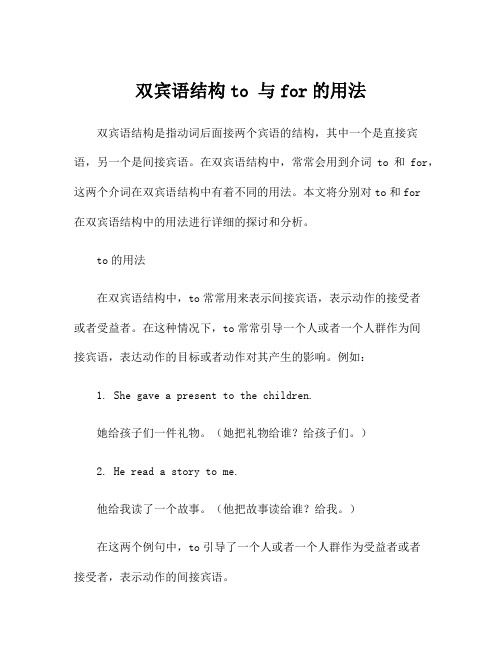
双宾语结构to 与for的用法双宾语结构是指动词后面接两个宾语的结构,其中一个是直接宾语,另一个是间接宾语。
在双宾语结构中,常常会用到介词to和for,这两个介词在双宾语结构中有着不同的用法。
本文将分别对to和for在双宾语结构中的用法进行详细的探讨和分析。
to的用法在双宾语结构中,to常常用来表示间接宾语,表示动作的接受者或者受益者。
在这种情况下,to常常引导一个人或者一个人群作为间接宾语,表达动作的目标或者动作对其产生的影响。
例如:1. She gave a present to the children.她给孩子们一件礼物。
(她把礼物给谁?给孩子们。
)2. He read a story to me.他给我读了一个故事。
(他把故事读给谁?给我。
)在这两个例句中,to引导了一个人或者一个人群作为受益者或者接受者,表示动作的间接宾语。
此外,to还可以用来表示双宾语结构中的直接宾语,这种情况下通常是用在动词的被动语态中。
例如:1. The money was given to the charity.这笔钱被捐赠给了慈善机构。
2. The letter was sent to her by mistake.这封信被误发给了她。
在这两个例句中,to引导了动作的直接受益者或者直接对象,同时也引导了被动语态中的主语。
for的用法在双宾语结构中,for常常用来表示直接宾语,表示动作的目的、用途或者目标。
在这种情况下,for通常引导一个目的、用途或者目标的名词短语作为直接宾语,表示动作的目的或者动作所针对的对象。
例如:1. She bought a book for her daughter.她给她的女儿买了一本书。
(她买书是为了什么?为了她的女儿。
)2. He made a cake for his friend.他给他的朋友做了蛋糕。
(他做蛋糕是为了什么?为了他的朋友。
)在这两个例句中,for引导了动作的目的、用途或者目标,表示动作的直接宾语。
for to at的用法区别
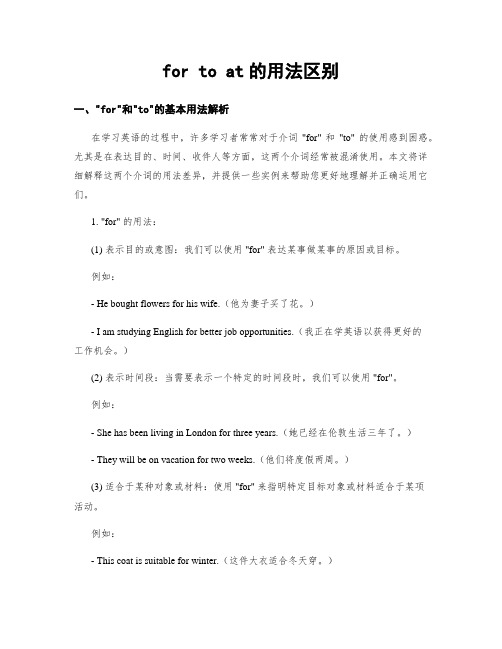
for to at的用法区别一、"for"和"to"的基本用法解析在学习英语的过程中,许多学习者常常对于介词"for" 和"to" 的使用感到困惑。
尤其是在表达目的、时间、收件人等方面,这两个介词经常被混淆使用。
本文将详细解释这两个介词的用法差异,并提供一些实例来帮助您更好地理解并正确运用它们。
1. "for" 的用法:(1) 表示目的或意图:我们可以使用 "for" 表达某事做某事的原因或目标。
例如:- He bought flowers for his wife.(他为妻子买了花。
)- I am studying English for better job opportunities.(我正在学英语以获得更好的工作机会。
)(2) 表示时间段:当需要表示一个特定的时间段时,我们可以使用 "for"。
例如:- She has been living in London for three years.(她已经在伦敦生活三年了。
)- They will be on vacation for two weeks.(他们将度假两周。
)(3) 适合于某种对象或材料:使用 "for" 来指明特定目标对象或材料适合于某项活动。
例如:- This coat is suitable for winter.(这件大衣适合冬天穿。
)- This pen is designed for left-handed people.(这支笔是专为左撇子设计的。
)2. "to" 的用法:(1) 表达方向或目的地:我们可以使用 "to" 来表示运动或旅行的目标地点。
例如:- I am going to the supermarket.(我要去超市。
简述for循环语句的执行顺序,举例说明

For循环是一种常用的控制流语句,用于重复执行特定的代码块。
它的执行顺序如下所述:1. 程序先执行for循环的初始化部分,例如for(int i=0; i<5; i++)中的i=0。
2. 程序会检查循环条件是否为真,即i<5是否成立。
3. 如果循环条件为真,则程序执行循环体内的代码块。
4. 循环体执行完毕后,程序会执行for循环的更新部分,例如i++。
5. 然后程序会再次检查循环条件,如果仍然为真,则重复执行循环体内的代码块;否则,退出for循环,继续执行下一条语句。
举例说明:假设有如下的for循环语句:```for(int i=0; i<5; i++) {System.out.println("Hello, world!");}```根据上述的执行顺序,该for循环的执行流程如下:1. 初始化部分: i=02. 检查循环条件: i<53. 循环体内执行: 打印"Hello, world!"4. 更新部分: i++5. 再次检查循环条件: i<56. 循环体内执行: 打印"Hello, world!"7. 更新部分: i++8. 再次检查循环条件: i<59. 循环体内执行: 打印"Hello, world!"10. 更新部分: i++11. 再次检查循环条件: i<512. 循环体内执行: 打印"Hello, world!"13. 更新部分: i++14. 再次检查循环条件: i<515. 循环体内执行: 打印"Hello, world!"16. 更新部分: i++17. 再次检查循环条件: i<5 (此时不成立,跳出for循环)上述的for循环语句将会执行5次,分别打印出5次"Hello, world!"。
for的用法和意思
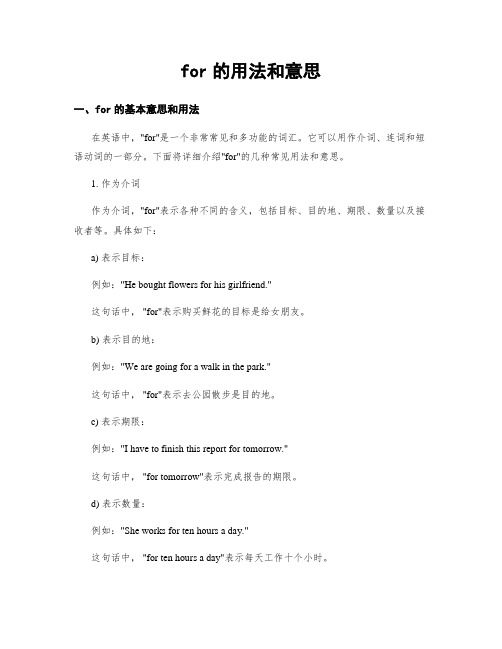
for的用法和意思一、for的基本意思和用法在英语中,"for"是一个非常常见和多功能的词汇。
它可以用作介词、连词和短语动词的一部分。
下面将详细介绍"for"的几种常见用法和意思。
1. 作为介词作为介词,"for"表示各种不同的含义,包括目标、目的地、期限、数量以及接收者等。
具体如下:a) 表示目标:例如:"He bought flowers for his girlfriend."这句话中, "for"表示购买鲜花的目标是给女朋友。
b) 表示目的地:例如:"We are going for a walk in the park."这句话中, "for"表示去公园散步是目的地。
c) 表示期限:例如:"I have to finish this report for tomorrow."这句话中, "for tomorrow"表示完成报告的期限。
d) 表示数量:例如:"She works for ten hours a day."这句话中, "for ten hours a day"表示每天工作十个小时。
e) 表示接收者:例如:"This gift is for you."这句话中, "for you"表示礼物是给你。
2. 作为连词除了作为介词外,"for"还可以用作连词,连接两个相关或结果上有关联的句子。
具体如下:a) 表示原因:例如:"She studied hard for she wanted to pass the exam."这句话中, "for"连接了两个句子,并表示前者的原因是后者。
“for”和时间名词搭配的惯用法

“for”和时间名词搭配的惯用法Unit 19课文中有两个句子:For a whole year,black people refused to take the city buses.His own house was destroyed and for some time his life was in danger.两个句子中的“for +时间名词(短语)”都是用来表示一种“时间的长度”作状语,表明某种行为状态延续的期限。
这种“for...”的搭配有一些值得注意的惯用法。
本文拟作些归纳分析。
一、用来和泛指的定量或不定量的时间名词短语连用。
其特点是,时间名词短语通常有不定冠词a,形容词性限定词some,many, a few以及定量数词two,three等限定,其位置可置于句首、句中或句末,置于句中时,常用逗号使前后分离。
可用于肯定句、疑问句或否定句。
(本文所引例句便属这种用法)再如:He stayed in Belgium for a few years,then he went to France.For two months Smith had lived alone there.He was,for a short time,ambassador to France.I haven't spoken to her for two months.要提醒注意的是:这种结构中的for不论在肯定句还是否定句中,一般都不可省略,但有些特殊情况与之有关,不能不附带提说:(1)for a time在没有形容词修饰,如for a short time,for a long time等,常具有“一下子,一时,暂时”的特殊意义。
如:I didn't know what to say for a time.(2)持续时间若直接置于某些动词之后时,有时“for”可以省略。
如:The lights still burned,and she stood(for) a moment.The meeting lasted(for)two hours.We stayed(for)a week.(3)当名词短语有限定词all,one等限定时,表持续时间,不再用“for”。
for+时间的用法
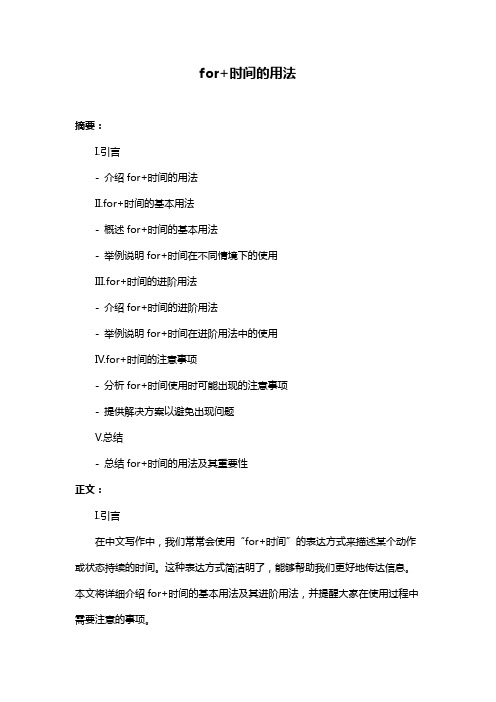
for+时间的用法摘要:I.引言- 介绍for+时间的用法II.for+时间的基本用法- 概述for+时间的基本用法- 举例说明for+时间在不同情境下的使用III.for+时间的进阶用法- 介绍for+时间的进阶用法- 举例说明for+时间在进阶用法中的使用IV.for+时间的注意事项- 分析for+时间使用时可能出现的注意事项- 提供解决方案以避免出现问题V.总结- 总结for+时间的用法及其重要性正文:I.引言在中文写作中,我们常常会使用“for+时间”的表达方式来描述某个动作或状态持续的时间。
这种表达方式简洁明了,能够帮助我们更好地传达信息。
本文将详细介绍for+时间的基本用法及其进阶用法,并提醒大家在使用过程中需要注意的事项。
II.for+时间的基本用法for+时间的基本用法可以概括为:“for+段时间”或“for+时”。
在这两种用法中,段时间可以是具体的时间长度,如“一个小时”、“两个月”;也可以是相对较长或较短的时间,如“很长时间”、“一会儿”。
例如:1.我等了他for一个小时。
2.她for两个月一直在减肥。
3.他们for很长时间没有见面了。
4.请for一会儿给我点时间考虑一下。
III.for+时间的进阶用法除了基本用法外,for+时间还有一些进阶用法。
例如,我们可以使用“for+段时间+了”来表示某个动作在过去的一段时间内一直在进行,强调动作的持续性。
另外,还可以使用“for+时+ing”来表示某个动作正在进行,强调动作的当前状态。
例如:1.他for一个月了都在准备考试。
2.她for five minutes一直在给我打电话。
3.他们for years一直是好朋友。
IV.for+时间的注意事项在使用for+时间的过程中,需要注意以下几点:1.for+时间通常用于描述持续一段时间的动作或状态,不适用于表示瞬间发生的动作。
2.在使用for+时间时,要确保时间状语与句子谓语动词的时态一致,避免出现时态不一致的情况。
for介词短语作定语

1. 介词for的用法原发布者:寥若星辰99介词for的常见用法归纳贵州省黔东南州黎平县黎平一中英语组廖钟雁介词for用法灵活并且搭配能力很强,是一个使用频率非常高的词,也是高考必考的重要词汇,现将其常见用法归纳如下,供参考。
1.表时间、距离或数量等。
①意为“在特定时间,定于,安排在约定时间”。
如:Themeetingisarrangedfor9o'clock.会议安排在九点进行。
②意为“持续达”,常于last、stay、wait等持续性动词连用,表动作持续的时间,有时可以省略。
如:Hestayedforalongtime.他逗留了很久。
Themeetinglasted(for)threehours.会议持续了三小时。
③意为“(距离或数量)计、达”。
例如:Hewalkedfortwomiles.他走了两英里。
Theshopsentmeabillfor$100.商店给我送来了100美元的账单。
2.表方向。
意为“向、朝、开往、前往”。
常与head、leave、setoff、start等动词连用。
如:TomorrowTomwillleaveforBeijing.明天汤姆要去北京。
Heputonhiscoatandheadedforthedoor他穿上大衣向门口走去。
介词to也可表示方向,但往往与come、drive、fly、get、go、lead、march、move、return、ride、travel、walk等动词连用。
3.表示理由或原因,意为“因为、由于”。
常与thank、famous、reason、sake等词连用。
如:ThankyouforhelpingmewithmyEnglish.谢谢你帮我学习英语。
Forseveralreasons,I'drathernotmeethim.由于种种原因,我宁可不见他。
TheWestLa2. 介词短语做定语和状语的区别(分析一些for的句子)介词短语作状语A)介词短语作状语,用来修饰动词。
for和of的用法

for和of的用法一、for和of的用法介绍人们在学习英语语法时,经常会遇到一些词的用法有些相似,但又有微妙差别的情况。
其中,for和of就是这样一对令人头疼却不得不面对的词。
它们看似简单常见,但实际上却存在着许多细微之处需要注意。
本文将详细探讨for和of的各种使用情况,以便读者更好地理解它们。
二、for和of的基本意义和区别1. for“for”是一个常见且多功能的前置介词,在英语中有多种含义和用法。
首先,“for”表示目标或接受者。
例如:- I bought flowers for my mother to celebrate her birthday.(为了庆祝我的母亲的生日,我买了鲜花给她。
)这里,“for”表示目标,即我的母亲。
其次,“for”还可以表达时间、期间或持续时间。
例如:- I have been waiting for an hour.(我已经等了一个小时。
)这里,“for”表示时间段,即一个小时。
此外,“for”还可以表示目的、原因、利益等。
例如:- She studied hard for a good grade.(她努力学习是为了取得好成绩。
)这里,“for”表示她的目的或利益。
2. of“of”是一个介词,在英语中有多种用法和含义。
首先,“of”可以表示来源、隶属或拥有。
例如:- This book is a classic of English literature.(这本书是英国文学的经典之作。
)这里,“of”表示隶属关系,即英国文学的一部分。
其次,“of”还可以表达材料、构成或组成关系。
例如:- The statue is made of marble.(这座雕像是由大理石制成的。
)这里,“of”表示材料关系,即雕像由大理石构成。
另外,“of”也可以表示特征、属性或性质。
例如:- She has a pair of beautiful blue eyes.(她有一双漂亮的蓝眼睛。
the reason for 中for用法说明
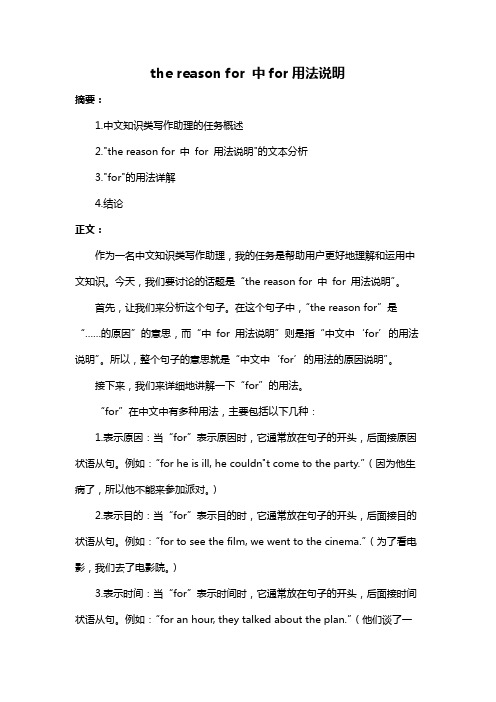
the reason for 中for用法说明摘要:1.中文知识类写作助理的任务概述2."the reason for 中for 用法说明"的文本分析3."for"的用法详解4.结论正文:作为一名中文知识类写作助理,我的任务是帮助用户更好地理解和运用中文知识。
今天,我们要讨论的话题是“the reason for 中for 用法说明”。
首先,让我们来分析这个句子。
在这个句子中,“the reason for”是“……的原因”的意思,而“中for 用法说明”则是指“中文中‘for’的用法说明”。
所以,整个句子的意思就是“中文中‘for’的用法的原因说明”。
接下来,我们来详细地讲解一下“for”的用法。
“for”在中文中有多种用法,主要包括以下几种:1.表示原因:当“for”表示原因时,它通常放在句子的开头,后面接原因状语从句。
例如:“for he is ill, he couldn"t come to the party.”(因为他生病了,所以他不能来参加派对。
)2.表示目的:当“for”表示目的时,它通常放在句子的开头,后面接目的状语从句。
例如:“for to see the film, we went to the cinema.”(为了看电影,我们去了电影院。
)3.表示时间:当“for”表示时间时,它通常放在句子的开头,后面接时间状语从句。
例如:“for an hour, they talked about the plan.”(他们谈了一个小时的计划。
)4.表示条件:当“for”表示条件时,它通常放在句子的开头,后面接条件状语从句。
例如:“for it is raining, you"d better take an umbrella.”(因为下雨,你最好带把伞。
)以上就是“for”在中文中的主要用法。
需要注意的是,虽然“for”在英文中有多种用法,但在中文中,它的用法通常比较固定,主要是表示原因、目的、时间和条件。
for和to的用法区别
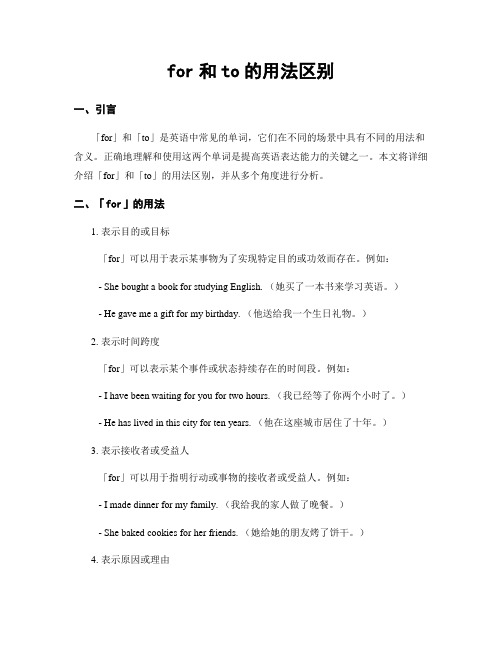
for和to的用法区别一、引言「for」和「to」是英语中常见的单词,它们在不同的场景中具有不同的用法和含义。
正确地理解和使用这两个单词是提高英语表达能力的关键之一。
本文将详细介绍「for」和「to」的用法区别,并从多个角度进行分析。
二、「for」的用法1. 表示目的或目标「for」可以用于表示某事物为了实现特定目的或功效而存在。
例如:- She bought a book for studying English. (她买了一本书来学习英语。
)- He gave me a gift for my birthday. (他送给我一个生日礼物。
)2. 表示时间跨度「for」可以表示某个事件或状态持续存在的时间段。
例如:- I have been waiting for you for two hours. (我已经等了你两个小时了。
) - He has lived in this city for ten years. (他在这座城市居住了十年。
)3. 表示接收者或受益人「for」可以用于指明行动或事物的接收者或受益人。
例如:- I made dinner for my family. (我给我的家人做了晚餐。
)- She baked cookies for her friends. (她给她的朋友烤了饼干。
)4. 表示原因或理由「for」可以用于表示某个行动或状态的原因或理由。
例如:- He apologized to her for being late. (他为迟到向她道歉。
)- They were punished for breaking the rules. (他们因破坏规则受到了惩罚。
)5. 表示交换或替代「for」可以表示交换或替代的关系,常与动词「exchange」、「substitute」等连用。
例如:- I traded my old car for a new one. (我用我的旧车换了一辆新车。
to和for的用法和区别

to和for的用法和区别一、概述在学习英语中,to和for是常见的介词,它们在句子中扮演着重要的角色。
虽然它们看似相似,但它们的用法和意义有一些区别。
本文将以详细解释和举例的方式来讨论to和for的用法及区别。
二、to的用法1. 表示方向或目的地:例如,“She went to the supermarket.”(她去了超市。
)在这个例子中,to表示她前往的目标。
2. 表示传递或移交:例如,“I gave the book to him.”(我把书给了他。
)在这个例子中,to表示动作发生时物品从一个人转移到另一个人。
3. 表示时间上限制:例如,“We need to finish this project by tomorrow.”(我们需要在明天之前完成这个项目。
)这里,to表示时间上的限制或截止日期。
三、for的用法1. 表示目标受益者:例如,“I bought a gift for my mother's birthday.”(我为母亲的生日买了一份礼物。
)在这个例子中,for表示某人是动作的直接受益者。
2. 表示目的:例如,“He is studying hard for his exams.”(他正在为考试努力学习。
)在这个例子中,for表示某事的目的或目标。
3. 表示原因:例如,“She apologized for her mistake.”(她为自己的错误道歉。
)这里,for表示某个行为或情况的原因或缘由。
四、to与for的区别1. 动词和介词搭配:大多数动词与to连用,少数动词与for连用,如agree to、ask for、listen to等。
2. 目的和受益者:to表示目标位置或移交,而for表示受益者或目的。
3. 不同语境下的使用:根据具体语境和句意来选择适当的介词是很重要的。
五、案例分析1. “She gave the money to the homeless man.”使用to表达了钱是从她那儿转移到无家可归男人那儿。
to和for的用法区别
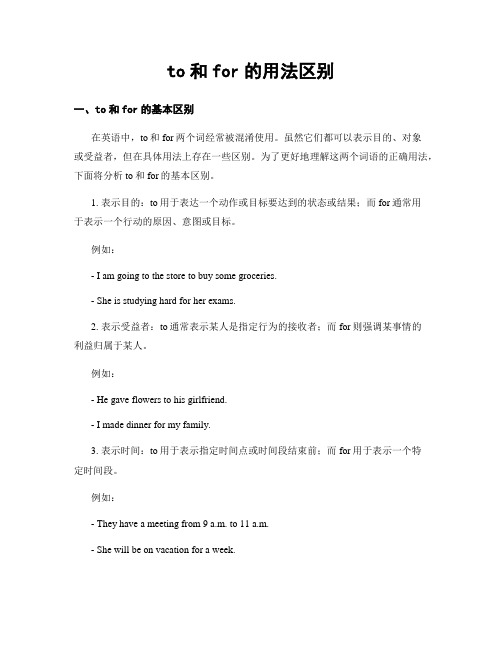
to和for的用法区别一、to和for的基本区别在英语中,to和for两个词经常被混淆使用。
虽然它们都可以表示目的、对象或受益者,但在具体用法上存在一些区别。
为了更好地理解这两个词语的正确用法,下面将分析to和for的基本区别。
1. 表示目的:to用于表达一个动作或目标要达到的状态或结果;而for通常用于表示一个行动的原因、意图或目标。
例如:- I am going to the store to buy some groceries.- She is studying hard for her exams.2. 表示受益者:to通常表示某人是指定行为的接收者;而for则强调某事情的利益归属于某人。
例如:- He gave flowers to his girlfriend.- I made dinner for my family.3. 表示时间:to用于表示指定时间点或时间段结束前;而for用于表示一个特定时间段。
例如:- They have a meeting from 9 a.m. to 11 a.m.- She will be on vacation for a week.4. 表示交换:当表示交换时,to常与give等动词搭配;而for则与receive等动词合作。
例如:- Can you give this book to me?- She received an award for her achievements.5. 动词短语和习惯表达中的使用:有一些固定的动词短语和习惯表达中,to或for被固定使用。
例如:- I am looking forward to the weekend.- Thank you for your help.二、常见用法示例1. to的常见用法:- 表示方向或移动:She is going to the park.- 表示时间:I will see you at 7 p.m.- 表示比较:Her writing skills are superior to mine.- 表示目的/意图:I am here to help you.- 表示倾向/趋势:He tends to be late for meetings.2. for的常见用法:- 表示受益者:This gift is for you.- 表示目标/目的:I am studying hard for my exams.- 表示原因/理由:She got a promotion for her hard work.- 表示交换或转让:I will trade my car for your motorcycle.- 为了某事而采取行动:Please wait here for a moment.三、易混淆用法有时,to和for在特定情况下容易产生混淆。
for与to与of的用法区别 (2)

for与to与of的用法区别一、"For"与"To"的用法区别在英语中,介词是非常重要的一部分。
它们对于构成完整、准确的句子至关重要。
本文将讨论"for"和"to"两个介词的用法区别,并解释它们在不同语境中的具体含义和应用场景。
1. "For"的用法:1.1 表示目的或目标:例如:I bought some flowers for my mother's birthday.(我为了我母亲生日买了些花。
)1.2 引导原因或理由:例如:She was late for work because of the traffic.(她因为交通堵塞上班迟到。
)1.3 表示持续时间:例如:He studied for five hours last night.(昨晚他学习了五个小时。
)1.4 表示接受或得到某物:例如:She asked for a glass of water.(她要求来杯水。
)二、具体用法示例及解释2.1 "For"的其他用法:2.1.1 代表某类人或事物:例如:This book is for children aged 3 to 5 years old.(这本书适合3到5岁儿童阅读。
)2.1.2 代表支持、赞成:例如:I'm all for equal opportunities for everyone.(我完全支持为每个人提供平等的机会。
)2.1.3 用于表示比率或换算:例如:The exchange rate for USD to EUR is 1 to 0.85.(美元对欧元的汇率是1比0.85。
)2.2 "To"的用法:2.2.1 表示方向或目标:例如:She went to the supermarket to buy some groceries.(她去超市买一些食品杂货。
- 1、下载文档前请自行甄别文档内容的完整性,平台不提供额外的编辑、内容补充、找答案等附加服务。
- 2、"仅部分预览"的文档,不可在线预览部分如存在完整性等问题,可反馈申请退款(可完整预览的文档不适用该条件!)。
- 3、如文档侵犯您的权益,请联系客服反馈,我们会尽快为您处理(人工客服工作时间:9:00-18:30)。
用法4:为得到,为拿到,为取得
• He went home for his book. 他回家拿书。 • He went to his friend for advice. 他去向朋友请教。 • She often asked her parents for money. 她经常向父母要钱。 • We all hope for success. 我们都盼望成功。 • Are you coming in for some tea? 你要不要进来喝点茶?
为卖出某物而打广告;advertise for sth=为寻找某物而打广告。如: advertise for a job=登广告求职。由于受汉语“为”的影响,而此处误 加了介词 for。类似地,汉语中的“为人民服务”,说成英语是 serve the people,而不是 serve for the people,“为某人的死报仇”,说成 英语是 avenge sb’s death,而不是 avenge for sb’s death,等等。
她。
• 【用法说明】有些表原因的特殊结构不宜用介词 for 来引出,而用其 他介词。如:
• 他由于努力工作而加了工资。 • 误:For the result of his hard work, he got a pay rise. • 正:As a [the] result of his hard work, he got a pay rise. • 注:as a [the] result of 是习语,意为“由于……的结果”。 • 因为母亲不在家,她只好自己做饭。 • 误:For Mother (being) away, she had to cook the meal herself. • 正:With Mother (being) away, she had to cook the meal herself. • 注:“with+宾语+宾语补足语”可用来表示原因,此时的 with 不能换
用法2:(表利益)为,为了
• (2) 注意不要按汉语字面意思,在一些及物动词后误加介词 for: • 他们决定在电视上为他们的新产品打广告。 • 误:They decided to advertise for their new product on TV. • 正:They decided to advertise their new product on TV. • 注:advertise 可用作及物或不及物动词,但含义不同:advertise sth=
for的用法
主讲-Anna
用法1:(表目的)为了
• They went out for a walk. 他们出去散步了。 • What did you do that for? 你干吗这样做? • That’s what we’re here for. 这正是我们来的目的。 • What’s she gone for this time? 她这次去干什么去了? • He was waiting for the bus. 他在等公共汽车。 • 【用法说明】在通常情况下,英语不用 for doing sth 来表示目的。如: • 他去那儿看他叔叔。 • 误:He went there for seeing his uncle. • 正:He went there to see his uncle. • 但是,若一个动名词已名词化,则可与 for 连用表目的。如: • He went there for swimming. 他去那儿游泳。(swimming 已名词化) • 注意:若不是表目的,而是表原因、用途等,则其后可接动名词。(见
用法3:(表用途)用于,用来
• Knives are used for cutting things. 小刀是用来切东西的。 • This knife is for cutting bread. 这把小刀是用于切面包的。 • It’s a machine for slicing bread. 这是切面包的机器。 • The doctor gave her some medicine for her cold. 医生给了她一些感冒药
• He cooked us some potatoes. / He cooked some potatoes for us. 他为我们 煮了些土豆。
• 注意,类似下面这样的句子必须用 for: • He bought a new chair for the office. 他为办公室买了张新办公椅。
下面的有关用法)
用法2:(表利益)为,为了
• What can I do for you? 你想要我什么? • We study hard for our motherland. 我们为祖国努力学习。 • Would you please carry this for me? 请你替我提这个东西好吗? • Do more exercise for the good of your health. 为了健康你要多运动。 • 【用法说明】(1) 有些后接双宾语的动词(如 buy, choose, cook, fetch,
用法5:给(某人),供(某人)用
• That’s for you. 这是给你的。 • Here is a letter for you. 这是你的信。 • Have you room for me there? 你那边能给我腾出点地方吗?
用法6:(表原因、理由)因为,由于
• I am sorry for it. 对不起。 • Thank you for coming to see me. 谢谢你来看我。 • You can’t see the wood for the trees. 你只见树木,不见森林。 • He is famous for his poems. 他因为他的诗出名。 • He was sent to prison for robbery. 他因为抢劫而坐牢。 • I couldn’t speak for laughing. 我笑得说不出话来。 • He couldn’t sleep for joy. 他高兴得不能入睡。 • For several reasons, I’d rather not meet her. 由于种种原因,我宁愿不见
find, get, order, prepare, sing, spare 等),当双宾语易位时,通常用 for 来引出间接宾语,表示间接宾语为受益者。如:
• She made her daughter a dress. / She made a dress for her daughter. 她为 她女儿做了件连衣裙。
